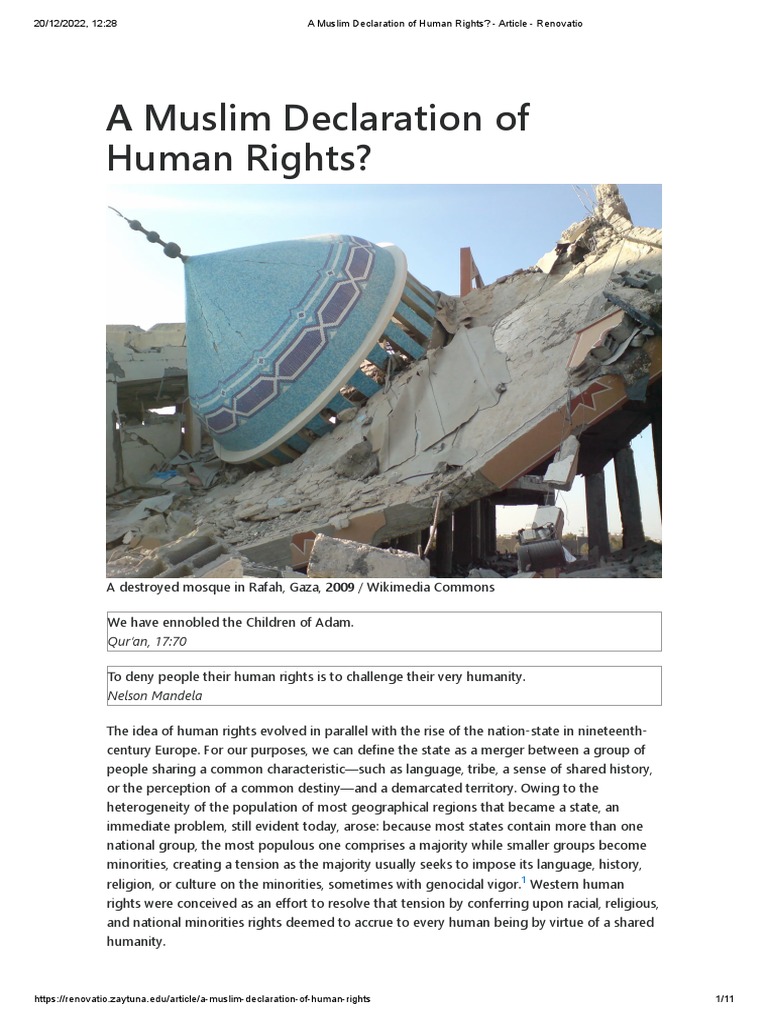The intersection of human rights and religious law often presents a myriad of complexities. In the context of Baha’i teachings and Sharia law, this topic invites contemplation and invites inquiry. Can these two frameworks coexist in harmony, or do fundamental discrepancies render them incompatible? This exploration seeks to clarify the Baha’i perspective on human rights in relation to Islamic law, examining their distinct principles, potential conflicts, and opportunities for integration.
At the core of Baha’i theology is a profound commitment to the sanctity and dignity of the individual. Central to this philosophy is the recognition of equal rights for all human beings, as espoused in the works of Baha’u’llah, the founder of the Baha’i Faith. He articulated a vision that transcends cultural, national, and religious boundaries, emphasizing that every person is entitled to fundamental rights and freedoms. The Baha’i teachings thus offer a comprehensive framework for human rights that encompasses social, economic, and political dimensions, advocating for justice and equity.
In contrast, Sharia law, derived from the Qur’an and Hadith, provides a legal and ethical foundation for Muslims. It encompasses a wide range of moral guidance and civil legislation, addressing personal conduct, family relations, economic transactions, and communal obligations. Yet, interpretations of Sharia can significantly vary across different cultures and sects, leading to divergent applications that may or may not align with contemporary understandings of human rights. How then do the Baha’i teachings intersect with or diverge from the principles embedded within Sharia?
Baha’i teachings underscore the importance of compassion, justice, and the pursuit of knowledge, vital components imperative to upholding human rights. One of the fundamental tenets of the Baha’i Faith is the idea that religion must be in harmony with reason and science. The Baha’i writings assert that any religious principle that contradicts the needs and welfare of humanity should be re-examined and, where necessary, reformulated. This distinct emphasis promotes an adaptive understanding of rights and responsibilities, allowing for evolution alongside the progression of societal values.
In contrast, traditional interpretations of Sharia have often faced scrutiny for their perceived rigidity, especially regarding women’s rights, freedom of expression, and minority rights. The Baha’i perspective invites a reconsideration of these elements, arguing that Sharia, similarly to all religious legal systems, should evolve to reflect contemporary moral standards and human dignity. This notion poses a pertinent challenge: how do practitioners of Sharia reconcile traditional interpretations with the expanding framework of human rights?
Furthermore, the Baha’i Faith asserts that the advancement of civilization is predicated on the recognition of the oneness of humanity. This is encapsulated in the principle that all human beings, regardless of ethnicity, gender, or religion, should have equal access to rights and opportunities. Baha’i discourse on human rights advocates for universal education, the elimination of prejudice, and the establishment of global governance structures that promote unity and collaboration. This outlook starkly contrasts with the environments where strict interpretations of Sharia may impose limitations on personal freedom and expression.
Moreover, the Baha’i commitment to justice entails active participation in the promotion of human rights. Followers are encouraged to advocate for the marginalized, speak out against injustices, and foster environments where dialogue and understanding can flourish. This proactive stance creates a dichotomy whereby some interpretations of Sharia may seem passively aligned with human rights violations due to cultural or traditional barriers that inhibit reform. Thus, the Baha’i response to such discrepancies necessitates an earnest dialogue stemming from mutual respect and shared principles.
The dialogue between Baha’i teachings and Sharia law also brings into focus the concept of spirituality as a driving force behind moral and ethical behavior. While Sharia emphasizes adherence to divinely-prescribed laws, Baha’i teachings advocate for a deeper spiritual engagement where individuals are encouraged to develop inner virtues that inspire ethical conduct. This differentiation poses another philosophical challenge: can spiritual understanding lead to a more humane application of Sharia within communities? The answer lies in the interplay between personal spiritual growth and communal legal frameworks.
In practical terms, the Baha’i community exemplifies a model of how distinct religious perspectives can coexist and mutually enrich one another. Baha’is actively engage in interfaith dialogue and are committed to advocating for human rights across cultures. This proactive approach offers an alternative to sectarian conflict, promoting collaboration that transcends religious boundaries. Within this paradigm, the challenge becomes less about confrontation and more about understanding and cooperation.
In conclusion, while there may exist tensions between human rights principles espoused in Baha’i teachings and certain interpretations of Sharia law, the potential for constructive collaboration remains substantial. The Baha’i perspective advocates for a reinterpretation of religious laws that can enhance human dignity and social justice. As global society grapples with these complexities, bridging the gap between distinct religious frameworks through dialogue and mutual respect may provide a pathway toward greater understanding and the realization of universal human rights for all.
